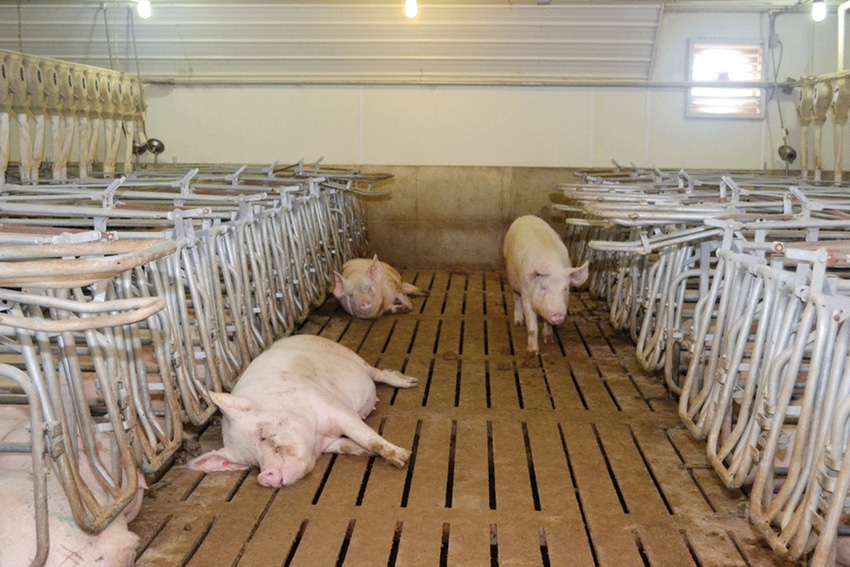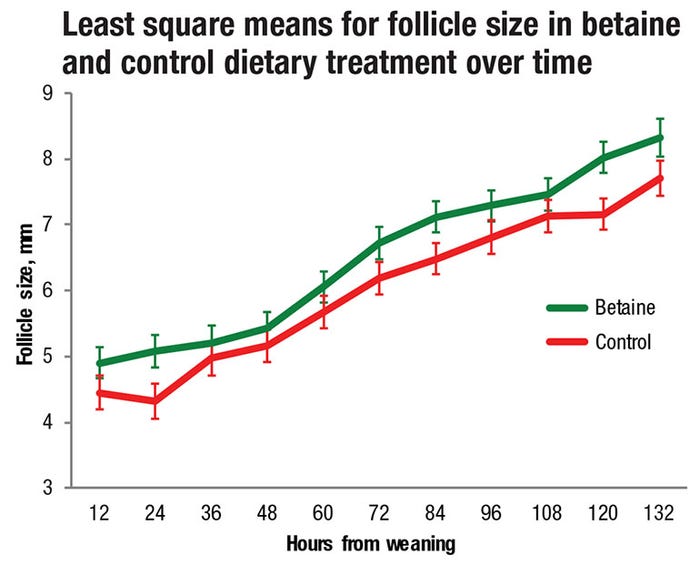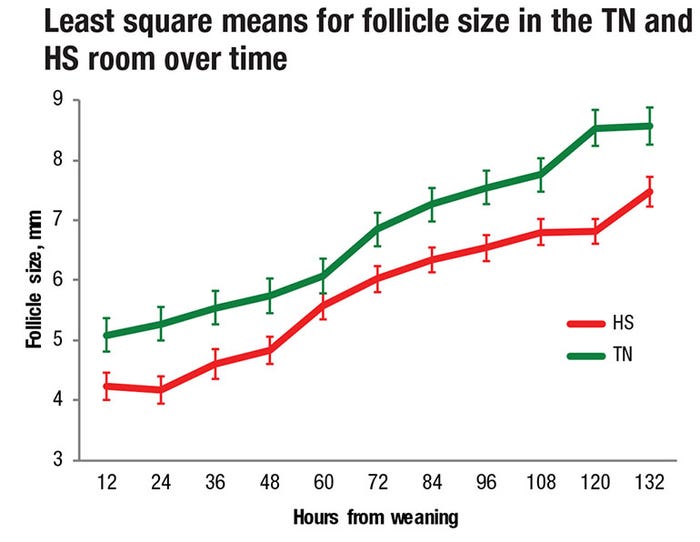Research finds betaine reduces heat stress impact on sows
Betaine supplementation partially reduced the negative impacts of heat stress on the sow, by reducing her body temperature and improving follicular development during the post-weaning period.
January 13, 2017

Heat stress has multiple impacts on animal metabolism and physiology. These include increased body core temperature, homeorhetic adaptations to dissipate radiant heat, increased respiration rates, reduced intestinal barrier integrity, elevated circulating concentration of stress markers and reduced feed intake as a strategy to reduce heat production. In 2003, Normand St-Pierre and colleagues estimated that heat stress costs the U.S swine industry over $360 million annually.
Heat stress can impair the ovarian function, and decreased follicular growth rate, increased occurrence of anestrus and longer wean-to-estrus intervals have been reported in sows during high ambient temperatures. The impaired ovarian function can be attributed to the reduction in blood flow to ovaries, since during heat stress more blood flow is directed to the skin to dissipate heat.
Betaine is a tri-methyl derivative of glycine, which is synthesized from choline, and it acts as an osmoprotectant by increasing water retention capacity in cells. Betaine has a relevant role in the conversion of homocysteine into methionine, and high levels of homocysteine have been associated with defective implantation and early pregnancy failure in women. Dietary betaine supplementation has been shown to improve reproductive performance in sows when betaine was supplemented during lactation.
The objectives of this trial were to have a better understanding of the underlying metabolic and physiological changes during heat stress in lactating sows and to evaluate to what extent betaine supplementation can reduce the effects of heat stress.
Twenty sows were housed in two rooms (each with 10 sows) to simulate heat stress (HS: 31 degrees C from 8 a.m. to 4 p.m. and 26 degrees C for the rest of the day) or thermoneutral (TN: 22 degrees C during the entire trial) conditions. Treatments were randomly allotted to each sow to receive 0.00% or 0.22% of a betaine supplement in their diets. Sows were blocked by parity as they entered the farrowing rooms at days 110-112 of gestation.
Sows housed in the HS condition had ad libitum access to feed. Sows housed in the TN condition were pair-fed with sows in the HS room. Data were analyzed as a 2 x 2 factorial arrangement of treatments, with two levels of room temperatures and two dietary betaine levels. Respiration rates, rectal and skin temperatures were recorded every day (7:30 a.m. and 3:30 p.m.) from the first day in the farrowing room to weaning. Blood samples from sows were taken at different days during the trial (before move-in, days 7 and 14, weaning and three days post-weaning). Follicle size was measured every 12 hours with a real-time ultrasound from weaning to ovulation. Treatment by room interaction was not significant for any variable (P > 0.11).

Betaine-supplemented sows had 0.23 degrees C lower rectal temperature than control sows (P = 0.048). Respiration rates, rectal and skin temperatures were 36 breaths per minute, 0.4 and 3.6 degrees C greater under HS than TN conditions, respectively (P < 0.004). Homocysteine and cortisol serum concentrations did not differ between treatments (P > 0.44) or environments (P > 0.25).
Betaine-supplemented sows had 0.51 millimeter greater follicle diameter than control sows (P = 0.043). The mean follicle diameter was 0.97 millimeter smaller under HS than TN conditions (P = 0.003).
Regression analysis indicated that room temperature differences in follicular size were due to differences in the time of follicular growth initiation and not in the rate of growth.
Interestingly, the follicle size at ovulation did not differ between housing conditions (P = 0.79), but the time from weaning to ovulation was 2.1 days greater in HS than TN sows (P = 0.005). Heat stress affects follicle size at the same hours post-weaning and delays the time of ovulation, but does not affect the follicle’s size at ovulation.

What does this mean?
Heat stress, with effects of feed intake controlled in this experiment, delays the initiation of follicle development on the ovary in the post-weaned sow. This results in sows that are heat stressed having an increased number of days from weaning to estrus and to time of ovulation.
In this experiment, betaine supplementation partially reduced the negative impacts of heat stress on the sow, by reducing her body temperature and improving follicular development during the post-weaning period.
It is well documented that during the summer months when ambient temperatures are elevated, many reproductive parameters are negatively impacted. One such is a delay in the return to estrus following weaning in sows as heat will delay follicular development on the ovary following weaning. The wean-to-estrus interval is a predominant factor in calculating non-productive sow days, which negatively impact reproductive efficiency and profitability.
Additionally, some farms utilize reproductive technologies where the timing of heat detection and artificial insemination are crucial to their success, such as PG-600 or timed AI. A delay in the wean-to-estrus interval or a follicle developing on the ovary would render some technologies useless. Feeding of betaine during lactation partially reduced the negative impact of heat stress on follicle development during the post-weaning period, and could be further investigated as a mitigation strategy for heat stress in post-weaned sows.
The benefit would come if methods could be used to reduce heat stress during lactation. Such methods are being developed, and are scheduled to be announced at the Midwest American Society of Animal Science meeting in March. The benefits could be currently achieved to realize that the most intense heat checking and mating will be delayed and the need for fresh semen will be delayed after times of heat stress. Betaine partially reduced the impact of heat stress and merits further research with larger numbers of sows.
Researchers: F.A. Cabezón, K.R. Stewart, A.P. Schinckel and B.T. Richert, Purdue University Department of Animal Sciences.
Funding was provided by Indiana Pork through the National Pork Board; NPB project: No. 15-138. The funding source had no involvement in the study design, collection, analysis and interpretation of the data.
You May Also Like



